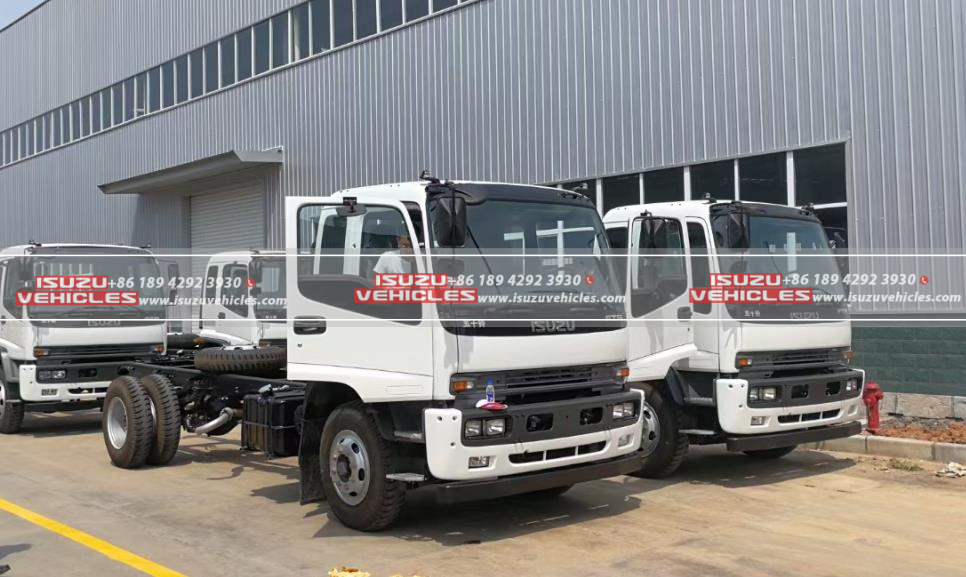In industries where the safe and efficient transport of liquids is non-negotiable—from fuel distribution to chemical logistics—ISUZU tanker trucks have established themselves as paragons of reliability. These specialized vehicles are engineered to handle the unique challenges of liquid cargo, balancing exacting safety standards with operational efficiency. Whether navigating winding mountain roads or operating in densely populated urban centers, ISUZU’s tanker fleet ensures that liquids reach their destinations intact, on time, and without compromise. This article explores the engineering principles, technological innovations, and strategic applications that make these trucks indispensable in global supply chains.
Precision Engineering for Liquid Stability
The science of transporting liquids demands far more than robust construction—it requires precision engineering to manage dynamic forces. Unlike solid cargo, liquids shift during transit, creating sloshing effects that challenge vehicle stability. ISUZU tanker trucks address this through compartmentalized tanks featuring baffle systems that minimize wave motion. These baffles are strategically welded to create chambers, reducing liquid movement by up to 70% while maintaining fast loading and unloading capabilities.
The trucks’ chassis, crafted from high-tensile steel, is optimized for weight distribution. By positioning the tank’s center of gravity lower than industry standards, ISUZU enhances cornering stability—a critical feature when navigating sharp turns with 10,000-gallon fuel loads. Paired with air-ride suspensions that adjust damping force in real time, these design choices ensure smooth operation even on poorly maintained roads.
Advanced Safety Systems for Hazard Mitigation
Transporting volatile or hazardous liquids necessitates fail-safe mechanisms. ISUZU tanker trucks integrate advanced safety systems that exceed global regulatory requirements. Multi-stage pressure relief valves automatically vent excess vapor during temperature fluctuations, preventing tank overpressurization. Grounding systems with continuous monitoring ensure static electricity dissipates safely during fuel transfers, while emergency shutoff valves can isolate leaks within 0.3 seconds of detection.
The inclusion of roll stability control (RSC) technology exemplifies ISUZU’s proactive safety approach. Using gyroscopic sensors, RSC predicts rollover risks and selectively applies brakes to individual wheels, correcting the vehicle’s trajectory before instability occurs. This system proves particularly vital in mountainous regions where elevation changes and sharp descents test driver reflexes.
Optimizing Performance Through Preventive Maintenance
The corrosive nature of many liquids accelerates wear on tanker components. Preventive maintenance protocols tailored to ISUZU’s design specifications are essential for maximizing service life. Operators should prioritize three key areas:
- Interior Tank Inspections: Ultrasonic testing every 6 months detects thinning walls in chemical tankers, while robotic crawlers equipped with 4K cameras inspect polyethylene-lined water tanks for micro-fissures.
- Valve and Pump Calibration: Monthly testing of bottom-loading systems ensures flow rates remain within ±1% of factory specifications.
- Corrosion Management: Sacrificial anode replacements and cathodic protection systems combat electrochemical degradation in coastal environments.
These practices not only prevent failures but also maintain compliance with stringent certifications like API 652 for petroleum tankers.
Versatile Configurations for Diverse Industries
The true strength of ISUZU tanker trucks lies in their adaptability. Modular designs allow rapid reconfiguration for different cargo types:
- Fuel Transport: Aluminum alloy tanks with vapor recovery systems meet EPA Phase II standards.
- Chemical Hauling: Stainless steel construction with epoxy coatings resists acidic compounds.
- Food-Grade Liquids: Polished interior surfaces and sanitary valves adhere to FDA guidelines.
In agricultural regions, ISUZU’s liquid fertilizer variants feature rear-mounted spray bars for direct field application, doubling as mobile irrigation units during droughts. This flexibility extends to municipal services, where ISUZU’s expertise in fluid dynamics informs complementary vehicles like the ISUZU fire truck and ISUZU sprinkler truck, creating integrated solutions for urban water management.
The Future of Liquid Transport: Smart Fleet Integration
Modern ISUZU tanker trucks are evolving into connected nodes within IoT-enabled logistics networks. Telematics systems monitor cargo temperature, tank pressure, and driver behavior, streaming data to centralized dashboards. Predictive analytics forecast maintenance needs with 92% accuracy, while route optimization algorithms consider real-time traffic and weather to reduce fuel consumption by up to 15%.
In firefighting fleets, this technology enables seamless coordination between ISUZU fire trucks and water tankers during large-scale emergencies. Similarly, municipalities leverage data from ISUZU sprinkler trucks to synchronize street cleaning schedules with tanker-based water deliveries, optimizing resource allocation.
By harmonizing mechanical excellence with digital intelligence, ISUZU ensures its tanker trucks remain at the forefront of an industry where precision, safety, and adaptability define success. As global demand for specialized liquid transport grows, these vehicles continue to set benchmarks—proving that in the delicate dance of fluid logistics, every drop counts.
